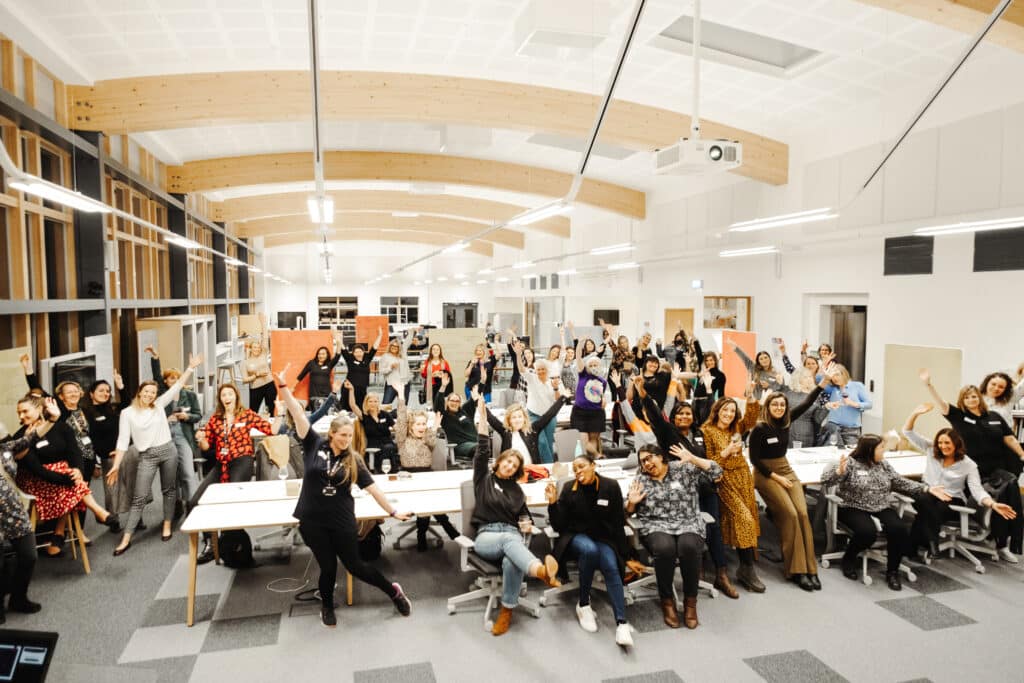- What do the local experts really think about the future of AI
- TECwomen CONNECT presents a conversation on Women and AI on 13th July in Truro
Artificial Intelligence (AI) is a very hot topic at the moment and with the recent news that the UK is to host a major global AI summit in Autumn it’s hard to escape the conversation.
But what do the local experts really think about AI and what the real impact will be on local businesses, jobs and skills development?
Ahead of the upcoming TECwomen CONNECT event which is centred on AI, the Digital Skills Partnership for Cornwall and Isles of Scilly has asked local tech leaders to share their AI experiences and opinions.
Tanuvi Ethunandan, CEO and Founder of Data Duopoly said:
“AI seems to be the beginning of a ‘sci-fi style’ world according to the media. However, the reality is that it has been an evolution of digital technology since the mid-20th century. AI started with the automation of simple tasks and is now evolving to machine learning (where the machine can learn from existing data and therefore improve and make predictions based on the data), deep learning (where layers of neural networks are used to process data and make decisions) and now generative AI (where new written, visual and auditory content can be created based on prompts or existing data). This provides a plethora of new job opportunities to utilise these tools, not only in the digital/tech sector but also across industries. There will be a period of learning and adapting as businesses and individuals understand how to fully utilise these tools. Just as social media created new industries, marketing techniques and jobs, AI will do the same over time. It certainly is an exciting time, with the growing opportunities to create social and economic benefits across industries utilising this technology!”
Niki Davies, Director of Software Cornwall said:
“AI is a tool like any other, but the difference here is that it has the potential to be disruptive and it is not specific to any one industry. At Software Cornwall, we’re encouraging Cornish businesses to put time and energy into understanding AI and how it will impact their business because if your business can be impacted by AI then it can also be turned into an opportunity. If its possibilities are understood, it can be harnessed and businesses and individuals can capitalise on its potential. In business, it can be a source of information, used to create documentation and code, automate repetitive processes and be available to your clients 24/7 – and right now it’s still in its infancy. It would be unwise to suggest that it won’t impact job roles, because it will, but enabling automation and having tools that can complete tasks for you can free up time that can be used to innovate, whatever industry you’re in. At Software Cornwall, we’re running regular workshops and training sessions on AI and ChatGPT to help any business get to grips with the technology, understand it in depth and adapt their business plan to move with it. As with most technologies, the worst thing you can do is bury your head.”
Emily King, B2B tech content specialist said:
“The algorithms we’re calling AI for the time being do have the potential to improve some aspects of work, that can’t be ignored. Repetitive tasks that form parts of people’s day to day work could be automated using what’s currently available, and that’s a great use for these tools.
But I think the mistake I see a lot of people making with tools like ChatGPT right now are thinking it can replace creative thinking, and that includes problem solving. Or enhance it.
What tools like ChatGPT are great at doing is telling you what everyone else has done before. Ask it to come up with a marketing strategy for a specific service or product in a specific market, for instance, and it’ll trot out on the first instance the best practice expected for that product/service in that market. If you push it to go further, challenging it by saying that’s what everyone does, asking how can we stand out, it might go a bit further. But if you’re experienced at marketing you’ll see that its response is still something someone, somewhere has done before.
Good marketing, good brand awareness, involves doing your best to stand out from your competitors and make some noise. But if you follow what everyone else is doing, you’ll fail at that.
Businesses that think they can skimp on having humans give them creative or original thought, are going to find themselves quickly melting into the background. But businesses that use AI to automate mundane everyday tasks that prevent their people from having time to think will reap huge benefits, as those people will be freed up to think creatively about business challenges and goals.”
Lyssa-Fêe Crump, Founder of Kraken Marketing Limited said:
“As a marketing agency that works primarily with tech companies, we have a number of clients in the AI space. There are worrying stories in the press and people are voicing very valid concerns about the biases we’re seeing with these technologies – especially when they’re developed with non-diverse teams which allows for unconscious biases to enter machine learning models. This is a big concern and something that needs to be addressed urgently within the tech industry.
However, AI is also already helping us to accomplish amazing things.
One organisation we’ve been working with has been using AI to help improve diagnosis and treatment for patients. It’s providing better diagnosis of endometriosis without invasive surgery. It’s helping improve the ability of junior radiographers to quickly and correctly diagnose the presence of pneumothorax in chest x-rays and it’s helping more stroke patients achieve functional independence.
AI is already helping to change people’s lives, on a much bigger scale than just automating routine work processes.”
Christopher Weavill, CEO of Hertzian, the creators of Player XP said:
“Since 2015, Hertzian has established itself as a leading AI and machine learning authority. Our AI-powered solutions have been utilized by well-known organizations such as Warner Bros, the NHS, and numerous clients in the gaming industry. This extensive experience has positioned us as trusted experts in the academic, ethical, and commercial aspects of AI.
One of my primary concerns is the quality and expertise of organisations leading discussions on AI, particularly with the widespread emergence of technologies like ChatGPT. We recognize the need for reliable grounded guidance that people can value and trust, and we are committed to fulfilling that role.
However, it is critical to understand that the reasons for concern about AI are not what you might initially expect. AI has been in existence for a considerable time, albeit operating inconspicuously in the background.
Therefore, there is no need to be alarmed by its recent emergence—it has always been here. What we are currently witnessing is the widespread adoption of AI, accompanied by, dare I say it, a surge of misguided hype. Like the dot-com era, initial apprehension and criticism are natural, but AI will become a standard part of our lives with time.
AI has the potential to simplify our lives and enhance business operations. Embracing the ongoing discussions and taking an interest in technological advancements will pave the way for a bright future.”
Caitlin Gould, Co-Founder of Kensa Health and Co-Founder of TECwomen said:
“At TECwomen CIC we run workshops for schools, communities, and women that focus a lot on technology, engineering and creative digital skills. AI is rapidly being rolled out across all of these areas and there is a lot of fear about what it will mean for future skills and jobs. From AI replacing designers to it being used to write code, we know that people are worried about new skills being obsolete in a few years’ time. While people are right to be curious and ask these important questions, we believe that it is still very early to panic.
We encourage people to see AI as a tool, rather than a solution and encourage them to explore it and understand if only to also realise where it has weaknesses. We are also advocating for the continued challenge of the current versions of AI to be seen as solutions. What is rolling out now are very very early versions of what might someday be possible and they are very flawed. It’s been shown that a lot of the AI tools are sexist, racist, ageist, and have a huge amount of built-in bias based on the data they have been provided (or trained on). So while we don’t want people to panic, we do encourage discussions, discourse and a healthy level of critique. Just like we tell everyone don’t believe everything they read on the internet, we would strongly advise that people don’t put too much faith in AI in its current form and focus their energy instead on thinking about how it might be improved and used as a tool in the future.”
If you would like to join a bigger discussion on AI, and what it means for women in Cornwall, why not attend the next TECwomen CONNECT event – a conversation on Women and AI on Thursday 13th July at the Hall for Cornwall?
Find out more about the event here:
https://www.eventbrite.co.uk/e/tecwomen-connect-presents-a-conversation-on-women-and-ai-tickets-652032445597


